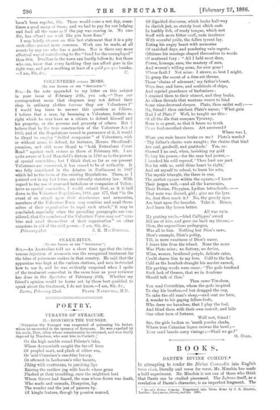POETRY.
TYRANTS OF SYRACUSE.
IL—DIONYSIUS THE YOUNGER.
[Dionysins the Younger NMI suspected of poisoning his father, whom be succeeded in the tyranny of Syracuse. He was expelled by his uncle, Dion, after whose assassination he returned, and was finally depoted by Timoleon, who sent him to Corinth.] ON the high marble round Peirene's lake,
Where Acrocorinth caught the far-off hum Of peopled mart, and plash of either sea, Or 'mid Craneium's sunshine luxury, Or oftenest in Lechosum's viler haunts, Jibing with courtezans, to parching lips Raising the earthen jug with hands whose gems Flashed at their trembling, once the mightiest lord Whom Greece had feared, the man whose frown was death, Who made and unmade, Dionysias, lay The wonder and the jest of passers by. Of kingly feature, though by passion marred, Of dignified discourse, which brake half-way In slavish jest, as stately bust A:rich ends In loathly fish, of ready tongue, which met Scoff with more bitter scoff, rude insolence With scornful pride, the fallen tyrant lay, Eating his angry heart with memories Of vanished days, and pondering vain regrets.
Ofttimes his musings shaped themselves to words Of muttered fury : "All I held most dear, Power, homage, ease, the mastery of men, And women's willing arms, for ever gone !
Whose fault? Not mine : I strove, as beat I might, To grasp the secret of a firm-set throne.
Those 'chains of adamant,' my father's boast, Were fear, and force, and multitude of ships, And myriad guardance of barbarians : I strained them to their utmost, and they brake, As silken threads that wantons weave to bind
Some wine-drowned sleeper. Plato, thou saidst well ,-
Ha, friend ! thou catchest Plato's name; What gain Had I of Plato ?' Well, he taught me this : Of all the ills that compass Tyranny, None is so great, as that it hears no truth From foul-mouthed slaves. Art answered ?
Where was I, When yon rude knave brake on me ? Plato's words 'Thy father's chains were naught ; the chains that bind Are zeal, goodwill, and gratitude.' Yea, so : Showed I no zeal, when, lavishing my gold To buy his power,—for the man had power,— I brooked his cold reproof, Thou bast nor part Nor lot with us, until thine heart be right,' And set myself to school, to learn his arts, The mystic triangle, the three in one, The perfect square within the square,—I know Their jargon well,—and all the harmonies, Their Dorian, Phrygian, Lydian tetrachords That note was discord, girl ; give me the lyre. So, dost thou mark it ? No, thy greedy eyes Are bent upon the bracelet. Take it. Hence, And learn thy lesson better.
All was vain.
My prating uncle,—kind Callippus' sword Rid me of him, and gave me back my throne,— Dion, the supercilious pedagogue, Was all to him. Nothing but Dion's saws, Dion's example, Dion's polity, Till, in mere weariness of Dion's name, I drave him from the island. None the more Was Plato mine; no flattery, no device, Wine, women, broidered purple, delicate cates, Could charm him to my love. Cold to the last, Cold as the hemlock-draught his master earned, His parting words were sneer: "The gods forefend Such lack of themes, that we in Academe Should talk of thee.'
Then came Timoleon, Yon mad Corinthian, whom the gods inspired To slay his brother,—I but drugged the cup, To calm the old man's sleep,—and sent me here, A wonder to his gaping fellow-fools, Who deem me harmless, that I play the fool, And blind them with their own conceit, and bide One other turn of fortune. Well met, friend !
See, the girls beckon us 'neath yonder shade, Where true Catanian liquor crowns the bowl ;- Your sand breeds sorry vintage ;—Shall we go ?” 0. OGLE.


































 Previous page
Previous page